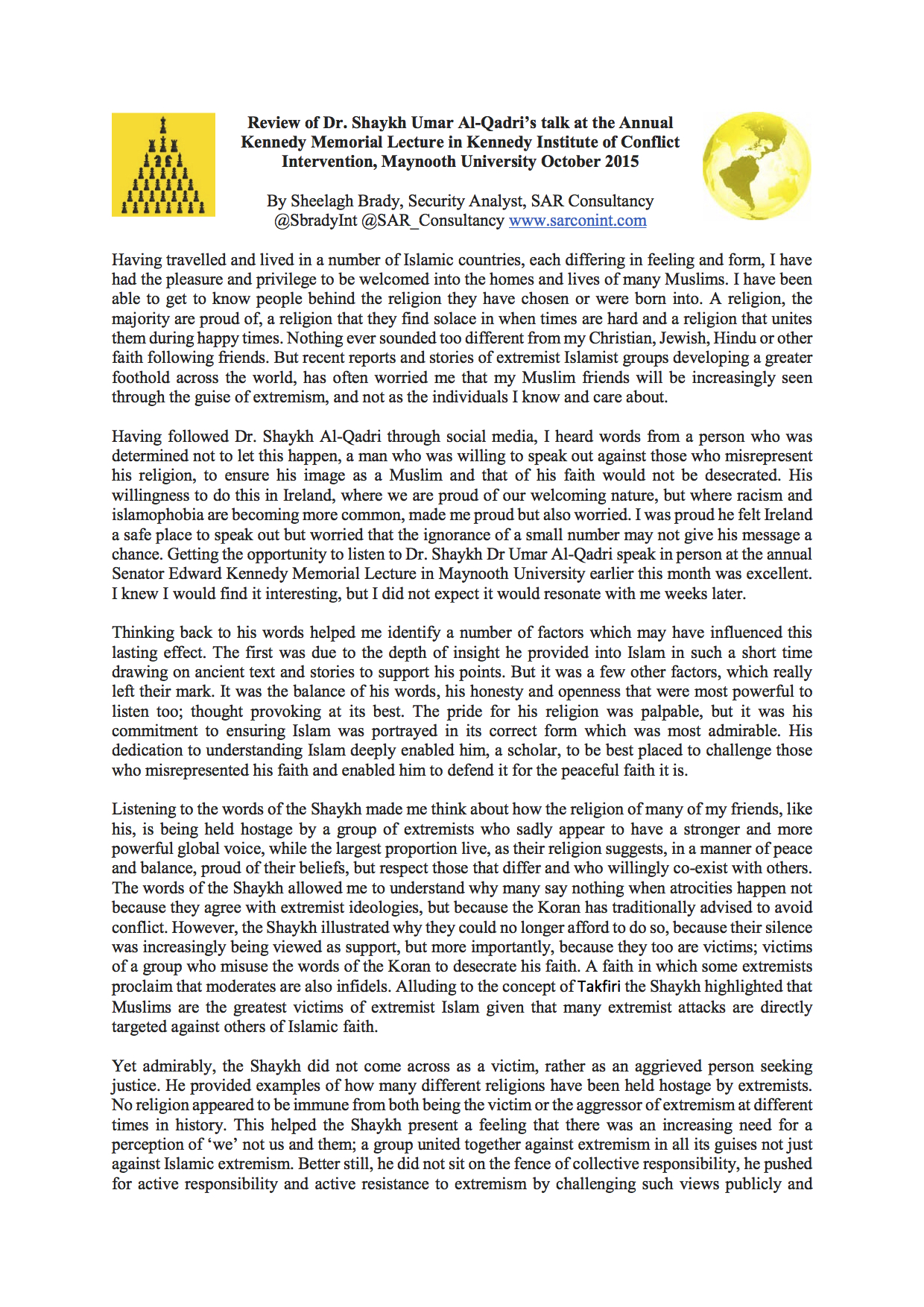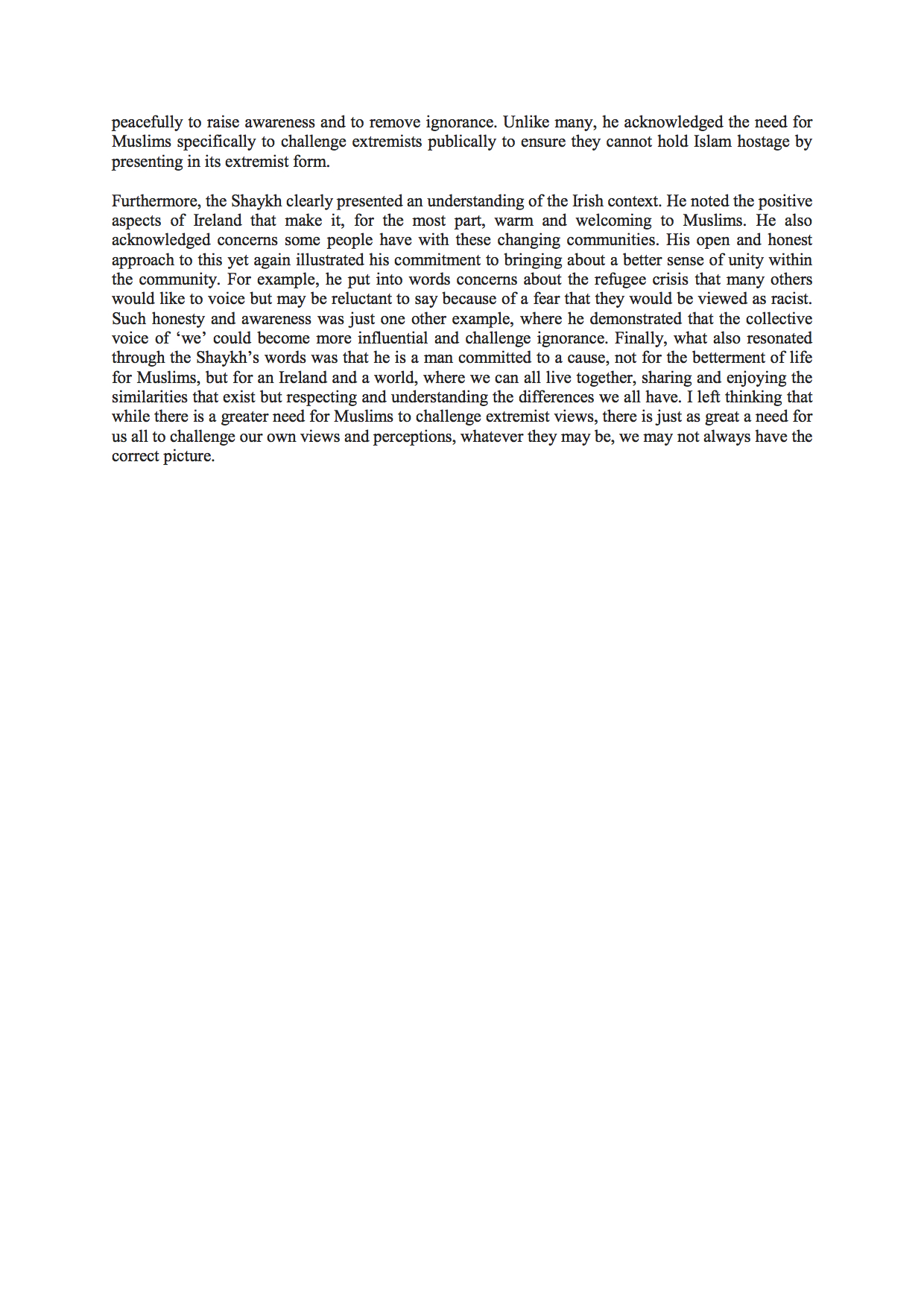Review of Shaykh Umar Al-Qadri’s talk at the Annual Kennedy Memorial Lecture in Kennedy Institute of Conflict Intervention, Maynooth University October 2015
By Sheelagh Brady, Security Analyst, SAR Consultancy @SbradyInt @SAR_Consultancy www.sarconint.com
Having travelled and lived in a number of Islamic countries, each differing in feeling and form, I have had the pleasure and privilege to be welcomed into the homes and lives of many Muslims. I have been able to get to know people behind the religion they have chosen or were born into. A religion, the majority are proud of, a religion that they find solace in when times are hard and a religion that unites them during happy times. Nothing ever sounded too different from my Christian, Jewish, Hindu or other faith following friends. But recent reports and stories of extremist Islamist groups developing a greater foothold across the world, has often worried me that my Muslim friends will be increasingly seen through the guise of extremism, and not as the individuals I know and care about.
Having followed Dr. Shaykh Al-Qadri through social media, I heard words from a person who was determined not to let this happen, a man who was willing to speak out against those who misrepresent his religion, to ensure his image as a Muslim and that of his faith would not be desecrated. His willingness to do this in Ireland, where we are proud of our welcoming nature, but where racism and islamophobia are becoming more common, made me proud but also worried. I was proud he felt Ireland a safe place to speak out but worried that the ignorance of a small number may not give his message a chance. Getting the opportunity to listen to Dr. Shaykh Dr Umar Al-Qadri speak in person at the annual Senator Edward Kennedy Memorial Lecture in Maynooth University earlier this month was excellent. I knew I would find it interesting, but I did not expect it would resonate with me weeks later.
Thinking back to his words helped me identify a number of factors which may have influenced this lasting effect. The first was due to the depth of insight he provided into Islam in such a short time drawing on ancient text and stories to support his points. But it was a few other factors, which really left their mark. It was the balance of his words, his honesty and openness that were most powerful to listen too; thought provoking at its best. The pride for his religion was palpable, but it was his commitment to ensuring Islam was portrayed in its correct form which was most admirable. His dedication to understanding Islam deeply enabled him, a scholar, to be best placed to challenge those who misrepresented his faith and enabled him to defend it for the peaceful faith it is.
Listening to the words of the Shaykh made me think about how the religion of many of my friends, like his, is being held hostage by a group of extremists who sadly appear to have a stronger and more powerful global voice, while the largest proportion live, as their religion suggests, in a manner of peace and balance, proud of their beliefs, but respect those that differ and who willingly co-exist with others. The words of the Shaykh allowed me to understand why many say nothing when atrocities happen not because they agree with extremist ideologies, but because the Koran has traditionally advised to avoid conflict. However, the Shaykh illustrated why they could no longer afford to do so, because their silence was increasingly being viewed as support, but more importantly, because they too are victims; victims of a group who misuse the words of the Koran to desecrate his faith. A faith in which some extremists proclaim that moderates are also infidels. Alluding to the concept of Takfiri the Shaykh highlighted that Muslims are the greatest victims of extremist Islam given that many extremist attacks are directly targeted against others of Islamic faith.
Yet admirably, the Shaykh did not come across as a victim, rather as an aggrieved person seeking justice. He provided examples of how many different religions have been held hostage by extremists. No religion appeared to be immune from both being the victim or the aggressor of extremism at different times in history. This helped the Shaykh present a feeling that there was an increasing need for a perception of ‘we’ not us and them; a group united together against extremism in all its guises not just against Islamic extremism. Better still, he did not sit on the fence of collective responsibility, he pushed for active responsibility and active resistance to extremism by challenging such views publicly and
peacefully to raise awareness and to remove ignorance. Unlike many, he acknowledged the need for Muslims specifically to challenge extremists publically to ensure they cannot hold Islam hostage by presenting in its extremist form.
Furthermore, the Shaykh clearly presented an understanding of the Irish context. He noted the positive aspects of Ireland that make it, for the most part, warm and welcoming to Muslims. He also acknowledged concerns some people have with these changing communities. His open and honest approach to this yet again illustrated his commitment to bringing about a better sense of unity within the community. For example, he put into words concerns about the refugee crisis that many others would like to voice but may be reluctant to say because of a fear that they would be viewed as racist. Such honesty and awareness was just one other example, where he demonstrated that the collective voice of ‘we’ could become more influential and challenge ignorance. Finally, what also resonated through the Shaykh’s words was that he is a man committed to a cause, not for the betterment of life for Muslims, but for an Ireland and a world, where we can all live together, sharing and enjoying the similarities that exist but respecting and understanding the differences we all have. I left thinking that while there is a greater need for Muslims to challenge extremist views, there is just as great a need for us all to challenge our own views and perceptions, whatever they may be, we may not always have the correct picture.


